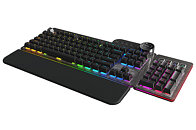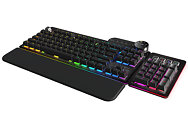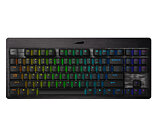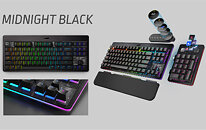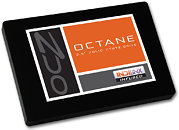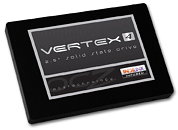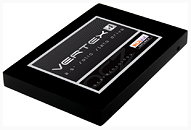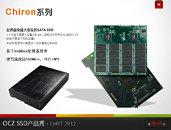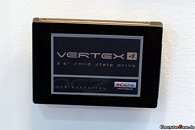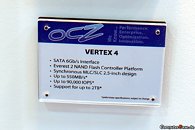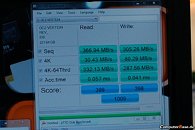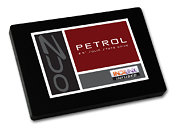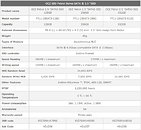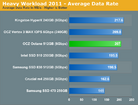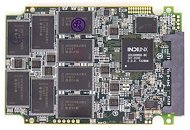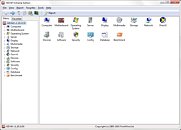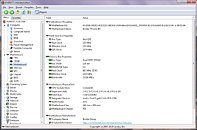Apr 13th, 2025 16:42 EDT
change timezone
Latest GPU Drivers
New Forum Posts
- should global c-state be "enabled" instead of auto on am5 x3d processors? (26)
- i need help with a ebay rx580 8gb 2048sp (12)
- GTX1080 Phoenix GLH broken? monitor signal but black screen? (3)
- Regarding fan noise (6)
- Upgrade for a GTX-1060 video card to a X570 AM4 MB w/ a Ryzen 9 3900X (18)
- Overclocking Micron F-die RAM (1)
- works and stops, random colored screens, Biostar RX560 896SPs (5)
- Memory integrity (0)
- Dell Latitude 5420 - i7 1185G7 (6)
- How to relubricate a fan and/or service a troublesome/noisy fan. (217)
Popular Reviews
- Thermaltake TR100 Review
- The Last Of Us Part 2 Performance Benchmark Review - 30 GPUs Compared
- TerraMaster F8 SSD Plus Review - Compact and quiet
- ASUS GeForce RTX 5080 TUF OC Review
- Zotac GeForce RTX 5070 Ti Amp Extreme Review
- ASRock Z890 Taichi OCF Review
- Sapphire Radeon RX 9070 XT Pulse Review
- Sapphire Radeon RX 9070 XT Nitro+ Review - Beating NVIDIA
- Upcoming Hardware Launches 2025 (Updated Apr 2025)
- AMD Ryzen 7 9800X3D Review - The Best Gaming Processor
Controversial News Posts
- NVIDIA GeForce RTX 5060 Ti 16 GB SKU Likely Launching at $499, According to Supply Chain Leak (181)
- MSI Doesn't Plan Radeon RX 9000 Series GPUs, Skips AMD RDNA 4 Generation Entirely (146)
- Microsoft Introduces Copilot for Gaming (124)
- NVIDIA Sends MSRP Numbers to Partners: GeForce RTX 5060 Ti 8 GB at $379, RTX 5060 Ti 16 GB at $429 (123)
- Nintendo Confirms That Switch 2 Joy-Cons Will Not Utilize Hall Effect Stick Technology (105)
- Over 200,000 Sold Radeon RX 9070 and RX 9070 XT GPUs? AMD Says No Number was Given (100)
- Nintendo Switch 2 Launches June 5 at $449.99 with New Hardware and Games (99)
- NVIDIA PhysX and Flow Made Fully Open-Source (77)
News Posts matching #Everest
Return to Keyword Browsing
AMD Lists Six "New" Ryzen 5000G SKUs, Zen 3's Lifespan Extended Again
AMD has quietly updated its web presences with six new processor SKUs—as spotted by Everest (aka Olrak29), and a member of Team Red's subreddit. Community detective work indicates official CPU support lists being updated at some point after February 11. Model names and product identifiers were highlighted; AMD is likely introducing additional Zen 3 "Cezanne" options for OEM partners. The Ryzen 5000G lineup of Zen 3 and Vega iGPU-powered APUs was already well populated, going back to 2021. The "newly" listed AM4 models are: Ryzen 7 5705GE, Ryzen 7 5705G, Ryzen 5 5605GE, Ryzen 5 5605G, Ryzen 3 5305GE and Ryzen 3 5305G.
The familiar "G" tag indicates the presence of an integrated graphics solution; a Cezanne GPU that utilizes GCN 5.1 architecture. A "GE" designation denotes lower power variants; with 35 W TDPs. A small selection of Zen 3-based Ryzen PRO models are available in GE form, including the Ryzen 5 PRO 5650GE SKU. Three of the recently discovered models seem to share identical specifications with Team Red's well established roster of Ryzen 7 5700G, Ryzen 5 5600G, and Ryzen 3 5300G options. Currently, dedicated product pages are not populated with information; instead you are greeted with a "404: Page Not Found" warning. AMD is well known for keeping its older technologies alive for long periods; its RDNA 3+ graphics architecture is expected to last until 2027 (or beyond).
The familiar "G" tag indicates the presence of an integrated graphics solution; a Cezanne GPU that utilizes GCN 5.1 architecture. A "GE" designation denotes lower power variants; with 35 W TDPs. A small selection of Zen 3-based Ryzen PRO models are available in GE form, including the Ryzen 5 PRO 5650GE SKU. Three of the recently discovered models seem to share identical specifications with Team Red's well established roster of Ryzen 7 5700G, Ryzen 5 5600G, and Ryzen 3 5300G options. Currently, dedicated product pages are not populated with information; instead you are greeted with a "404: Page Not Found" warning. AMD is well known for keeping its older technologies alive for long periods; its RDNA 3+ graphics architecture is expected to last until 2027 (or beyond).
Listan Group Acquires MOUNTAIN
The global Listan group of companies continues its impressive success story and announces today, with great pleasure, the acquisition of the innovative premium peripheral brand MOUNTAIN. The full acquisition makes MOUNTAIN the third wholly owned subsidiary alongside the popular products of be quiet! and Xilence brands. With MOUNTAIN as a brand for peripherals, the Listan Group expands into the category of high-quality input devices.
MOUNTAIN was founded in 2018 and was able to raise the bar in 2020 with its trend-setting Everest Max keyboard. Since then, MOUNTAIN has received hundreds of endorsements and awards from leading tech and gaming media around the world. Not to mention increased attention from influencers on YouTube, TikTok, Instagram and Twitch. The Makalu 67 lightweight gaming mouse was praised for its innovative exceptional design and, like the Everest Max, won the iF Design Award 2021. In October 2022, MOUNTAIN launched the DisplayPad and MacroPad. These are software-enabled controllers for streaming and content creation that further expand MOUNTAIN's ecosystem and customer reach.
MOUNTAIN was founded in 2018 and was able to raise the bar in 2020 with its trend-setting Everest Max keyboard. Since then, MOUNTAIN has received hundreds of endorsements and awards from leading tech and gaming media around the world. Not to mention increased attention from influencers on YouTube, TikTok, Instagram and Twitch. The Makalu 67 lightweight gaming mouse was praised for its innovative exceptional design and, like the Everest Max, won the iF Design Award 2021. In October 2022, MOUNTAIN launched the DisplayPad and MacroPad. These are software-enabled controllers for streaming and content creation that further expand MOUNTAIN's ecosystem and customer reach.
MOUNTAIN launches OBS Studio controls integration with Base Camp
[Editor's note: Our review of the Mountain Everest Max keyboard can be found here]
MOUNTAIN, creator of innovative, premium peripherals with user-centric design to enable gamers to perform at their best, brings integration of OBS Studio to Base Camp. Starting with version 1.0.36, MOUNTAIN's critically acclaimed management software interfaces with OBS Studio to allow for easy streaming setup and management.
Users of MOUNTAIN Everest mechanical keyboards will be able to create custom key bindings to easily access OBS Studio functions, significantly decreasing the complexity of setting up a streaming or recording setup. Everest Max' surplus of available buttons offers plenty of room for different functions, doing away with the need to remember complex hotkeys.
MOUNTAIN, creator of innovative, premium peripherals with user-centric design to enable gamers to perform at their best, brings integration of OBS Studio to Base Camp. Starting with version 1.0.36, MOUNTAIN's critically acclaimed management software interfaces with OBS Studio to allow for easy streaming setup and management.
Users of MOUNTAIN Everest mechanical keyboards will be able to create custom key bindings to easily access OBS Studio functions, significantly decreasing the complexity of setting up a streaming or recording setup. Everest Max' surplus of available buttons offers plenty of room for different functions, doing away with the need to remember complex hotkeys.
Mountain Partners with Plastic Bank to Extract 25000 kg of Ocean-bound Plastic
Mountain just released their Everest Keyboard series on Kickstarter in March and now announces a new partnership with Plastic Bank, a social enterprise that offers an internationally recognized root cause solution to preventing ocean plastic pollution. Ocean plastic is a global crisis, with the equivalent of one dump truck load of plastic every minute entering the world's oceans, mainly from Asian countries.¹ At the same time, many communities affected by plastic pollution face high levels of poverty. Plastic Bank is empowering the world to stop ocean plastic. Plastic Bank builds ethical recycling ecosystems in coastal communities, and reprocesses the materials for reintroduction into the global manufacturing supply chain.
"In this day and age everybody should think about our environment and what can be done to protect it.", said Tobias Brinkmann, CEO & Founder of Mountain. "We take our social responsibility very seriously and aim to do our part in preserving our precious planet. Minimizing the environmental impact of the production and distribution of each Everest keyboard played a large part in our design philosophy."
"In this day and age everybody should think about our environment and what can be done to protect it.", said Tobias Brinkmann, CEO & Founder of Mountain. "We take our social responsibility very seriously and aim to do our part in preserving our precious planet. Minimizing the environmental impact of the production and distribution of each Everest keyboard played a large part in our design philosophy."
Everest Customizable Keyboard Funded by More than 1000 Backers on Kickstarter
Everest is a fully customizable, mechanical gaming keyboard that is a revolution in choice. Despite a challenging time and hardships around the globe, Everest found tremendous success on Kickstarter, being funded by more than 1000 backers, and received high praise in a preview by Youtuber randomfrankp.
"The success Everest had on Kickstarter has been amazing and we appreciate the support from every backer," says Tobias Brinkmann, Founder & CEO of Mountain. "It shows that our user-centric design and mission to bring unique features to consumers resonated well with the market. As soon as the campaign was over, we received countless inquiries asking when Everest would be available for pre-order. The demand didn't show any signs of slowing down, and we look forward to serving all our customers when Everest is available for shipping." Effective immediately, Mountain launches its own brand store on mountain.gg, enabling everyone that missed the Kickstarter campaign to pre-order their Everest keyboard ahead of the launch in August.
"The success Everest had on Kickstarter has been amazing and we appreciate the support from every backer," says Tobias Brinkmann, Founder & CEO of Mountain. "It shows that our user-centric design and mission to bring unique features to consumers resonated well with the market. As soon as the campaign was over, we received countless inquiries asking when Everest would be available for pre-order. The demand didn't show any signs of slowing down, and we look forward to serving all our customers when Everest is available for shipping." Effective immediately, Mountain launches its own brand store on mountain.gg, enabling everyone that missed the Kickstarter campaign to pre-order their Everest keyboard ahead of the launch in August.
Everest Sets Stretch Goal for a Midnight Black Edition of its Innovative Keyboard
Everest is a fully customizable, mechanical gaming keyboard that is a revolution in choice. Brought to you by Mountain, Everest can be pre-ordered here, from 95€ ($90 / £85 - depending on exchange rate). The Everest keyboard is available in Barebone, Core (TKL) and Max versions. The new stretch goal enables a variant of Everest in Midnight Black, a deep black anodized aluminium design, if the campaign reaches at least 100,000€ before it ends on April 2nd. If reached, the stretch goal will enable every backer to choose between Gunmetal Gray and Midnight Black.
Many backers requested stretch goals and a large part of the community asked for an all-black version of Everest. Mountain's focus on the user-centric approach doesn't end with the product design. "We appreciate all the support we have received so far and continue to listen to customer feedback," says Tobias Brinkmann, Founder & CEO of Mountain. "With the incredible success of Everest on Kickstarter, it didn't take long until we received the first inquiries of stretch goals and a Black version was in particular high demand. We are all about freedom of choice and delivering products that customers ask for, so we are pleased to be able to do so with the Midnight Black Edition!"Support the Everest keyboard Midnight Black Kickstarter goal stretch here.
Many backers requested stretch goals and a large part of the community asked for an all-black version of Everest. Mountain's focus on the user-centric approach doesn't end with the product design. "We appreciate all the support we have received so far and continue to listen to customer feedback," says Tobias Brinkmann, Founder & CEO of Mountain. "With the incredible success of Everest on Kickstarter, it didn't take long until we received the first inquiries of stretch goals and a Black version was in particular high demand. We are all about freedom of choice and delivering products that customers ask for, so we are pleased to be able to do so with the Midnight Black Edition!"Support the Everest keyboard Midnight Black Kickstarter goal stretch here.

OCZ Announces 2 TB (1920 GB) Variant of its Intrepid 3000 Enterprise SSD
OCZ Storage Solutions -- a Toshiba Group Company and leading provider of high-performance solid-state drives (SSDs) for computing devices and systems, today announced a new series of SATA III SSDs to add to its Intrepid 3000 enterprise portfolio. The new Intrepid 3700 SSD Series delivers superior performance and I/O latency responses that dramatically improve application performance and I/O efficiencies, and supports higher storage densities up to 2TB representing OCZ's largest capacity enterprise SATA SSDs to date.
"Datacenter customers have asked for larger solid state drives that do not make any sacrifices in performance or endurance to address the need to manage the ever growing amounts of data being generated by today's computing environments," said Daryl Lang, CTO at OCZ Storage Solutions. "Our new Intrepid 3700 Series is designed to meet these market requirements for an easy to deploy solid state solution that delivers the very best balance of features, endurance, and capacity."
"Datacenter customers have asked for larger solid state drives that do not make any sacrifices in performance or endurance to address the need to manage the ever growing amounts of data being generated by today's computing environments," said Daryl Lang, CTO at OCZ Storage Solutions. "Our new Intrepid 3700 Series is designed to meet these market requirements for an easy to deploy solid state solution that delivers the very best balance of features, endurance, and capacity."

OCZ to Showcase Enterprise Storage Solutions at Gartner's Symposium/ITXpo 2013
OCZ Technology Group, Inc., a leading provider of high-performance solid-state drives (SSDs) for computing devices and systems, today announced that it will showcase its leading enterprise storage solutions at the Gartner Symposium/ITXpo, Booth #219, Walt Disney World Dolphin Resort, Lake Buena Vista, Florida, October 6th through 10th. As an annual gathering of CIOs and senior IT executives seeking the latest tools, technologies, and information to improve IT capabilities and data center effectiveness, the ITXpo is an excellent opportunity for OCZ to present its leading portfolio of enterprise storage solutions to this targeted audience.
Headlining OCZ's product presentations at ITXpo is the award-winning ZD-XL SQL Accelerator that delivers the convergence of hardware and software as one tightly integrated, optimized plug-and-play storage solution. This innovative solution accelerates and optimizes Microsoft SQL Server database applications and its high-performance flash-based PCI Express (PCIe) solid-state drive works in combination with intelligent acceleration and caching software to deliver the right and relevant database data when the application needs it.
Headlining OCZ's product presentations at ITXpo is the award-winning ZD-XL SQL Accelerator that delivers the convergence of hardware and software as one tightly integrated, optimized plug-and-play storage solution. This innovative solution accelerates and optimizes Microsoft SQL Server database applications and its high-performance flash-based PCI Express (PCIe) solid-state drive works in combination with intelligent acceleration and caching software to deliver the right and relevant database data when the application needs it.

OCZ Technology to Display New Enterprise Storage Solutions at Gartner's Symposium/ITX
OCZ Technology Group, Inc., a leading provider of high-performance solid-state drives (SSDs) for computing devices and systems, will display its enterprise storage solutions at the Gartner Symposium/ITXpo, Booth #1044, Walt Disney World Dolphin Resort, Lake Buena Vista, Florida, from October 21st through October 25th. The Gartner Symposium/ITXpo is an annual gathering of CIOs and senior IT executives seeking the latest tools, technologies, and information to improve IT capabilities and data center effectiveness.
For SAN acceleration of I/O intensive workloads, OCZ will present its leading Z-Drive R4 PCIe SSDs supporting both full-height (FH) and half-height (HH) configurations, enabling the CPU with direct access (zero-latency storage) and instant boot capabilities. The FH (3/4 length) RM88 model enables an industry best 2.8GB/s of sequential throughput, 410K of random IOPS performance, and usable MLC NAND flash capacities from 800GB to 3.2TB. The HH (half-length) RM84 model is also a performance leader enabling 2GB/s of sequential throughput, 250K of random IOPS performance and usable capacities from 300GB to 1.2TB.
For SAN acceleration of I/O intensive workloads, OCZ will present its leading Z-Drive R4 PCIe SSDs supporting both full-height (FH) and half-height (HH) configurations, enabling the CPU with direct access (zero-latency storage) and instant boot capabilities. The FH (3/4 length) RM88 model enables an industry best 2.8GB/s of sequential throughput, 410K of random IOPS performance, and usable MLC NAND flash capacities from 800GB to 3.2TB. The HH (half-length) RM84 model is also a performance leader enabling 2GB/s of sequential throughput, 250K of random IOPS performance and usable capacities from 300GB to 1.2TB.

OCZ Technology to Showcase Its Latest Enterprise Storage Solutions at FMA 2012
OCZ Technology Group, Inc., a leading provider of high-performance solid-state drives (SSDs) for computing devices and systems, will showcase its latest storage products, encompassing a mix of both solid state drives and software solutions, at this year's Flash Memory Summit, Booth #208, Santa Clara Convention Center, Santa Clara, California, from August 21st through August 23rd.
Demonstrating SSD products along with recent partner implementations, OCZ will showcase a comprehensive lineup of innovative solutions for business, server, and OEM clients. This includes product presentations of both the impending Intrepid 3 SATA III-based SSD solution based on the company's Indilinx Everest 2 architecture, along with the company's leading PCI Express (PCIe)-based Z-Drive R4 featuring new Linux Acceleration software (LXL) that unleashes the full performance potential of infrastructures that use this popular open source operating system. Live technical demos of LXL and Z-Drive R4 SSDs will include a VDI boot storm, efficient SQL CPU utilization, and vMotion and Fault Tolerance support.
Demonstrating SSD products along with recent partner implementations, OCZ will showcase a comprehensive lineup of innovative solutions for business, server, and OEM clients. This includes product presentations of both the impending Intrepid 3 SATA III-based SSD solution based on the company's Indilinx Everest 2 architecture, along with the company's leading PCI Express (PCIe)-based Z-Drive R4 featuring new Linux Acceleration software (LXL) that unleashes the full performance potential of infrastructures that use this popular open source operating system. Live technical demos of LXL and Z-Drive R4 SSDs will include a VDI boot storm, efficient SQL CPU utilization, and vMotion and Fault Tolerance support.

OCZ Adds 1 TB Capacity to Octane Series
OCZ introduced a new high capacity variant of its Octane consumer SSD series, the OCT1-25SAT3-1T. Built in the 2.5-inch form-factor with SATA 6 Gb/s interface, the new Octane variant provides 1 TB of unformatted capacity. Based on the Indilinx Everest processor, the drive packs 25 nm MLC NAND flash, and utilizes 512 MB of DRAM cache. It is rated to provide sequential transfer speeds of up to 460 MB/s (reads), 330 MB/s (writes), with 4K read/write random access performance of up to 24,000 IOPS and 32,000 IOPS, respectively. All modern consumer SSD features are present, including TRIM, NCQ, ECC, and 256-bit AES data-encryption. Slated for mid-May, the Octane 1 TB by OCZ won't exactly be cheap.

OCZ Technology Group, Inc. Reports Fiscal 2012 Fourth Quarter and Year-End Results
OCZ Technology Group, Inc., a leading provider of high-performance solid-state drives (SSDs) for computing devices and systems, reports its fourth quarter (Q4'12) and year-end results for the fiscal year 2012, (FY'12), which ended on February 29, 2012.
Financial Highlights
- Fiscal year 2012, net revenue increased 92% to $365.8 million compared with fiscal year 2011 net revenue of $190.1 million. Net revenue in Q4'12 was a record $110.4 million, and increased 71% compared with net revenue of $64.6 million reported in Q4'11.
- Fiscal year 2012, SSD revenue was $338.9 million, up 154% compared with $133.2 million in fiscal year 2011. Q4'12 SSD revenue reached a record $103.2 million; an increase of 77% compared with Q4'11 SSD revenue of $58.2 million.
- Fiscal year 2012 gross margins increased to 22.5% compared to 12.7% with fiscal year 2011. Q4'12 gross margin increased to 25.0% compared with 16.6% in Q4'11, and 22.5% in Q3'12.
- Net loss for Q4'12 was $10.9 million or $0.19 loss per share compared with a net loss of $9.3 million or $0.27 loss per share in Q4'11.
- Non-GAAP net loss for Q4'12 was $6.0 million or $0.11 loss per share as compared with a non-GAAP net loss for Q4'11 of $0.8 million or $0.02 loss per share.
Financial Highlights
- Fiscal year 2012, net revenue increased 92% to $365.8 million compared with fiscal year 2011 net revenue of $190.1 million. Net revenue in Q4'12 was a record $110.4 million, and increased 71% compared with net revenue of $64.6 million reported in Q4'11.
- Fiscal year 2012, SSD revenue was $338.9 million, up 154% compared with $133.2 million in fiscal year 2011. Q4'12 SSD revenue reached a record $103.2 million; an increase of 77% compared with Q4'11 SSD revenue of $58.2 million.
- Fiscal year 2012 gross margins increased to 22.5% compared to 12.7% with fiscal year 2011. Q4'12 gross margin increased to 25.0% compared with 16.6% in Q4'11, and 22.5% in Q3'12.
- Net loss for Q4'12 was $10.9 million or $0.19 loss per share compared with a net loss of $9.3 million or $0.27 loss per share in Q4'11.
- Non-GAAP net loss for Q4'12 was $6.0 million or $0.11 loss per share as compared with a non-GAAP net loss for Q4'11 of $0.8 million or $0.02 loss per share.

Indilinx Everest Essentially Marvell Silicon with Custom Firmware: OCZ
For those who thought with the Indilinx buyout and release of Everest and Kilimanjaro series NAND flash controllers, OCZ is on course of becoming a largely self-sufficient SSD industry player, here's a revelation. Its new Everest series silicon, used in recently-launched SSD families (such as Octane and Vertex 4), is essentially a re-badged Marvell controller (found on SSDs such as Crucial M4, Intel SSD 510), with custom firmware developed by OCZ. This discovery by Anandtech was confirmed by OCZ (Indilinx).
The Indilinx Everest (Octane and Petrol series) and Everest 2 (Vertex 4 series), are both re-badged Marvell chips with Indilinx firmware. Although it doesn't change anything, it perfectly explains how OCZ could come up with two "new" SSD controllers (Everest and Everest 2) almost instantly, after the Indilix acquisition. Everest 1 is essentially a higher-clocked Marvell 88SS9174, while Everest 2 could very well be a re-badged Marvell 88SS9187, according to the source.
The Indilinx Everest (Octane and Petrol series) and Everest 2 (Vertex 4 series), are both re-badged Marvell chips with Indilinx firmware. Although it doesn't change anything, it perfectly explains how OCZ could come up with two "new" SSD controllers (Everest and Everest 2) almost instantly, after the Indilix acquisition. Everest 1 is essentially a higher-clocked Marvell 88SS9174, while Everest 2 could very well be a re-badged Marvell 88SS9187, according to the source.

OCZ Technology Launches Next Generation Indilinx Everest SSD Controller Platform
OCZ Technology Group, Inc., a leading provider of high-performance solid-state drives (SSDs) for computing devices and systems, today introduced Indilinx Everest 2, its next-generation SSD platform that delivers an industry-best performance of 120,000 random input/output operations per second (IOPS) for SATA-based drives.
In addition to this unprecedented transactional performance, the Everest 2 features the most advanced flash management capabilities which can significantly extend NAND flash life and enhance SSD reliability. This innovative controller platform will debut in OCZ's new Vertex 4 SSD product line.
The Indilinx Everest 2 family of solid state drive processors establishes a new computing and storage paradigm by delivering breakthrough performance and uncompromising reliability to next-generation SSDs. Combining a 400M Hz dual-core CPU, 6 Gbps SATA Revision 3.0 interface, and support for the latest, most advanced NAND flash memory technology available, Everest 2 exceeds the needs of the most demanding SSD environments.
In addition to this unprecedented transactional performance, the Everest 2 features the most advanced flash management capabilities which can significantly extend NAND flash life and enhance SSD reliability. This innovative controller platform will debut in OCZ's new Vertex 4 SSD product line.
The Indilinx Everest 2 family of solid state drive processors establishes a new computing and storage paradigm by delivering breakthrough performance and uncompromising reliability to next-generation SSDs. Combining a 400M Hz dual-core CPU, 6 Gbps SATA Revision 3.0 interface, and support for the latest, most advanced NAND flash memory technology available, Everest 2 exceeds the needs of the most demanding SSD environments.

OCZ Announces the Indilinx Everest 2-based Vertex 4 Series SSD
OCZ Technology Group, Inc., a leading provider of high-performance solid-state drives (SSDs) for computing devices and systems, today introduced the Vertex 4 SATA III SSD series featuring the company's advanced Indilinx Everest 2 controller platform.
The Vertex 4 delivers the industry's highest input/output operations per second (IOPS) performance for SATA-based drives across a wide variety of application workloads making this fourth generation flagship product line ideally suited for demanding computing and workstation environments. It consistently accomplishes superior real world performance over the long term regardless of whether the data streams are in compressed or uncompressed formats.
The Vertex 4 delivers the industry's highest input/output operations per second (IOPS) performance for SATA-based drives across a wide variety of application workloads making this fourth generation flagship product line ideally suited for demanding computing and workstation environments. It consistently accomplishes superior real world performance over the long term regardless of whether the data streams are in compressed or uncompressed formats.

OCZ Chiron High-Capacity SSD Detailed
OCZ is also working on a high-capacity SSD line, targeting data-centers that seek higher performance and capacity, called Chiron. Built in the 3.5-inch form-factor with a 6 Gb/s serial interface (not sure if it's SAS or SATA), the Chiron is a complex SSD, which consists of multiple SSD sub-units, each driven by OCZ-Indilinx Everest controllers, maintained in an abstract RAID configuration by a localized RAID controller. The drive is available in capacities as high as 4 TB, and provides sequential performance as high as 560 MB/s, with 4K access performance of 100,000 IOPS.

OCZ Vertex 4 Solid State Drive Seen at CeBIT
As promised, OCZ Technology is showing off at CeBIT 2012 its newest Vertex Series solid state drive, the Vertex 4. Pictured below, the upcoming SSD is based around the Indilinx Everest 2 platform, it features synchronous MLC NAND Flash memory (SLC can be used for enterprise-oriented models), and is capable of transfer speeds of up to 550 MB/s and up to 90,000 IOPS.
The Vertex 4 drive on display at CeBIT has a 2.5-inch form factor, a SATA 6.0 Gbps interface, and, according to the live demos, it delivers sequential read/write speeds of 367/305 MB/s and up to 80,000 IOPS for 4k random reads.
The Vertex 4 drive on display at CeBIT has a 2.5-inch form factor, a SATA 6.0 Gbps interface, and, according to the live demos, it delivers sequential read/write speeds of 367/305 MB/s and up to 80,000 IOPS for 4k random reads.

OCZ SSDs Using Indilinx's Everest Platform Now Available in LG Z330 Ultrabooks
Indilinx, a leading provider of solid state drive (SSD) processors and a subsidiary of OCZ Technology Group, announces OCZ Indilinx SSDs based on the acclaimed Everest Series SATA 3.0 (6 Gbps) platform are shipping in LG Electronics' thinnest notebook yet, the Super Ultrabook Z300 based on the Intel Ultrabook initiative.
"We are excited to continue our partnership with LG Electronics and provide our Indilinx Everest based OEM SSDs for integration into the company's exciting new Super Ultrabook Z300," said Ryan Petersen, CEO of OCZ Technology. "These custom OEM Indilinx SSDs are the ideal solution for the Z300's ultra slim and stylish form factor, and help deliver a superior overall computing experience for customers with quicker transfer speeds and faster boot up."
"We are excited to continue our partnership with LG Electronics and provide our Indilinx Everest based OEM SSDs for integration into the company's exciting new Super Ultrabook Z300," said Ryan Petersen, CEO of OCZ Technology. "These custom OEM Indilinx SSDs are the ideal solution for the Z300's ultra slim and stylish form factor, and help deliver a superior overall computing experience for customers with quicker transfer speeds and faster boot up."

OCZ demos second-generation Indilinx Everest controller
OCZ seems to have put SSD chip development in overdrive since it's already showing off the Everest 2 controller although the first-gen Everest silicon has barely been out for a few months. Codenamed IDX400M00-BC, the new Everest chip is supposed to deliver sequential read/write speeds of up to 550/500 MB/s, up to 90,000 4 KB random write IOPS, and significantly improved small block performance.
The first solid state drives based on the Everest 2 are expected at the end of Q2.
The first solid state drives based on the Everest 2 are expected at the end of Q2.

OCZ Officially Announces the Petrol Series Solid State Drives
Leaked last week, OCZ's newest solid state drive, the Indilinx Everest-based 'Petrol' has now been made official and is confirmed to reach distribution channels in the 'coming weeks'.
The Petrol targets 'cost-sensitive' applications and has a 2.5-inch form factor, a SATA 6.0 Gbps interface, 2xnm asynchronous MLC NAND Flash memory (backed by the life span-enhancing NDurance technology), a MTBF of 1.25 million hours, TRIM support, and three years worth of warranty.
The Petrol targets 'cost-sensitive' applications and has a 2.5-inch form factor, a SATA 6.0 Gbps interface, 2xnm asynchronous MLC NAND Flash memory (backed by the life span-enhancing NDurance technology), a MTBF of 1.25 million hours, TRIM support, and three years worth of warranty.

OCZ to Introduce the Petrol SATA 6.0 Gbps Solid State Drives
Now that the Octane models are out and about, the OCZ Technology Group is preparing the launch of a second line of solid state drives based on the Indilinx Everest platform, the more value-minded Petrol series. Like the Octane SSDs, the Petrol drives feature a 2.5-inch form factor, a SATA 6.0 Gbps interface, and make use of the NDurance technology technology which increases the life span of NAND flash memory by as much as 2 times.
The Petrol models also have 2xnm asynchronous MLC (multi-level cell) NAND Flash memory (the Octane line uses synchronous MLC NAND), a MTBF of 1.25 million hours, TRIM support, and are backed by a three-year warranty.
The Petrol models also have 2xnm asynchronous MLC (multi-level cell) NAND Flash memory (the Octane line uses synchronous MLC NAND), a MTBF of 1.25 million hours, TRIM support, and are backed by a three-year warranty.

OCZ Octane 6 Gb/s Performance Looks Promising
Anandtech posted the first set of performance figures of OCZ Octane. The enthusiast community is looking at the outcome of OCZ Octane eagerly, because it is based on OCZ's own newest high-performance SATA 6 Gb/s SSD processor, the Indilink Everest, the first major Indilinx controller after OCZ's acquisition of the company. It adds to the options available to enthusiasts, between SandForce SF-228x based SSDs, and Marvell 88SS9174.
The [p]reviewer put the 512 GB 6 Gb/s variant of this drive though the site's "Heavy Workload 2011" test suite, in which it edged past Intel SSD 510 250 GB, but fell behind OCZ Vertex 3 MaxIOPS 240 GB and Kingston HyperX 240 GB, both driven by SandForce SF-2281 processors. So far the performance yield looks encouraging, considering that OCZ has managed such performance on a drive with relatively higher capacity. Apart from the Indilinx Everest, OCZ Octane features 512 MB of cache and Intel 25 nm Sync MLC NAND flash memory. OCZ will also introduce a value variant that uses the SATA 3 Gb/s interface and Async MLC NAND flash. Complete reviews of this drive will surface in the coming days.
The [p]reviewer put the 512 GB 6 Gb/s variant of this drive though the site's "Heavy Workload 2011" test suite, in which it edged past Intel SSD 510 250 GB, but fell behind OCZ Vertex 3 MaxIOPS 240 GB and Kingston HyperX 240 GB, both driven by SandForce SF-2281 processors. So far the performance yield looks encouraging, considering that OCZ has managed such performance on a drive with relatively higher capacity. Apart from the Indilinx Everest, OCZ Octane features 512 MB of cache and Intel 25 nm Sync MLC NAND flash memory. OCZ will also introduce a value variant that uses the SATA 3 Gb/s interface and Async MLC NAND flash. Complete reviews of this drive will surface in the coming days.
AIDA64 1.85 Released
FinalWire, the company behind AIDA64, and the people behind its predecessor Everest, announced the latest version of the popular system diagnostic and benchmarking suite, AIDA64 1.85. Apart from the usual load of security and stability fixes, AIDA64 1.85 packs a number of new features, including advanced multi-device Logitech LCD support; improved support for socket FM1 motherboards; temperature, fan and voltage measurement corrections; preliminary support for next-generation AMD Trinity accelerated processing units (APUs); support for NVIDIA GeForce 510 and GTX 580M; and support for detecting a GPU's compliance with OpenGL 4.2 API.DOWNLOAD: AIDA64 1.85 Installer | ZIP Package
FinalWire Acquires and Discontinues EVEREST
FinalWire Ltd. today announced the acquisition of diagnostics, hardware monitoring, network audit, and benchmarking software, Lavalys EVEREST. "Today is a significant step forward in our progress to deliver a class-leading diagnostics and benchmarking solution," said Tamas Miklos, managing director of FinalWire. "The addition of Lavalys' customers and technologies will enable us to accelerate investments, meet a wider set of customer needs through a richer solution set, increase efficiencies and significantly expand our opportunities for growth."
Beginning immediately, FinalWire will execute on the planned integration of the two companies' technologies and customers to ensure a smooth transition that will deliver immediate value for customers, partners and investors.
Beginning immediately, FinalWire will execute on the planned integration of the two companies' technologies and customers to ensure a smooth transition that will deliver immediate value for customers, partners and investors.
Lavalys Everest Transitions into New Software
Popular system information, diagnostics, and benchmarking suite Lavalys Everest (or plain "Everest"), is said to be undergoing an organizational overhaul, with its developer, Lavalys Inc. forking into two companies. Currently Lavalys is split into two parts, with software development and aftersales support located in Hungary, and sales located in Canada. We're getting to know that the Hungarian part is breaking up the partnership into a company of its own, named FinalWire and working on its own software functionally identical to Everest, called (for now?) as AIDA64 (pronounced /ˈaɪdəˌ/ 64). Incidentally, AIDA32 is the first name of Everest before it went on to become Everest.
What's with the change, and why is it important? Well, Everest has been commercially successful to enterprise users, as well and enthusiasts. If virtually every developer in Lavalys is now under FinalWire, there won't be an update of Everest for a very long time, if not forever. Under Everest's license, a user is entitled to updates for a mentioned period of time. To ease out the transition, FinalWire will likely provide continued support and updates to existing Everest users. As for what's going to be distinctly new about AIDA64, our contact mentions that the software will retain the UI of its predecessor (since Lavalys developers reserved copyrights to almost all of the code), all its functionality, and new features: notably all 64-bit benchmarks, a new SSD module that provides model-specific diagnostics of any SSD installed, and a new 64-bit system stability test mode (helps overclockers or high-uptime server builders). FinalWire should make an official announcement later this week.
What's with the change, and why is it important? Well, Everest has been commercially successful to enterprise users, as well and enthusiasts. If virtually every developer in Lavalys is now under FinalWire, there won't be an update of Everest for a very long time, if not forever. Under Everest's license, a user is entitled to updates for a mentioned period of time. To ease out the transition, FinalWire will likely provide continued support and updates to existing Everest users. As for what's going to be distinctly new about AIDA64, our contact mentions that the software will retain the UI of its predecessor (since Lavalys developers reserved copyrights to almost all of the code), all its functionality, and new features: notably all 64-bit benchmarks, a new SSD module that provides model-specific diagnostics of any SSD installed, and a new 64-bit system stability test mode (helps overclockers or high-uptime server builders). FinalWire should make an official announcement later this week.
Apr 13th, 2025 16:42 EDT
change timezone
Latest GPU Drivers
New Forum Posts
- should global c-state be "enabled" instead of auto on am5 x3d processors? (26)
- i need help with a ebay rx580 8gb 2048sp (12)
- GTX1080 Phoenix GLH broken? monitor signal but black screen? (3)
- Regarding fan noise (6)
- Upgrade for a GTX-1060 video card to a X570 AM4 MB w/ a Ryzen 9 3900X (18)
- Overclocking Micron F-die RAM (1)
- works and stops, random colored screens, Biostar RX560 896SPs (5)
- Memory integrity (0)
- Dell Latitude 5420 - i7 1185G7 (6)
- How to relubricate a fan and/or service a troublesome/noisy fan. (217)
Popular Reviews
- Thermaltake TR100 Review
- The Last Of Us Part 2 Performance Benchmark Review - 30 GPUs Compared
- TerraMaster F8 SSD Plus Review - Compact and quiet
- ASUS GeForce RTX 5080 TUF OC Review
- Zotac GeForce RTX 5070 Ti Amp Extreme Review
- ASRock Z890 Taichi OCF Review
- Sapphire Radeon RX 9070 XT Pulse Review
- Sapphire Radeon RX 9070 XT Nitro+ Review - Beating NVIDIA
- Upcoming Hardware Launches 2025 (Updated Apr 2025)
- AMD Ryzen 7 9800X3D Review - The Best Gaming Processor
Controversial News Posts
- NVIDIA GeForce RTX 5060 Ti 16 GB SKU Likely Launching at $499, According to Supply Chain Leak (181)
- MSI Doesn't Plan Radeon RX 9000 Series GPUs, Skips AMD RDNA 4 Generation Entirely (146)
- Microsoft Introduces Copilot for Gaming (124)
- NVIDIA Sends MSRP Numbers to Partners: GeForce RTX 5060 Ti 8 GB at $379, RTX 5060 Ti 16 GB at $429 (123)
- Nintendo Confirms That Switch 2 Joy-Cons Will Not Utilize Hall Effect Stick Technology (105)
- Over 200,000 Sold Radeon RX 9070 and RX 9070 XT GPUs? AMD Says No Number was Given (100)
- Nintendo Switch 2 Launches June 5 at $449.99 with New Hardware and Games (99)
- NVIDIA PhysX and Flow Made Fully Open-Source (77)








